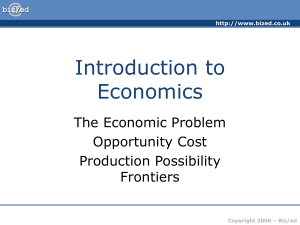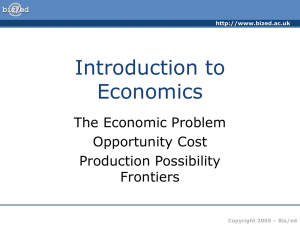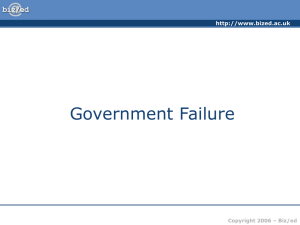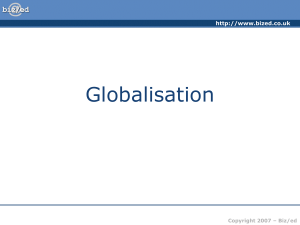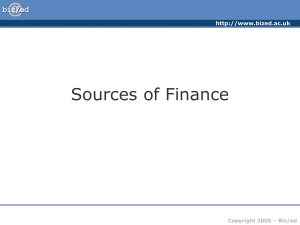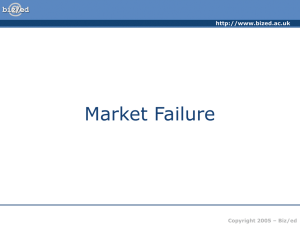Government Failure - BSAK Business & Economics
advertisement
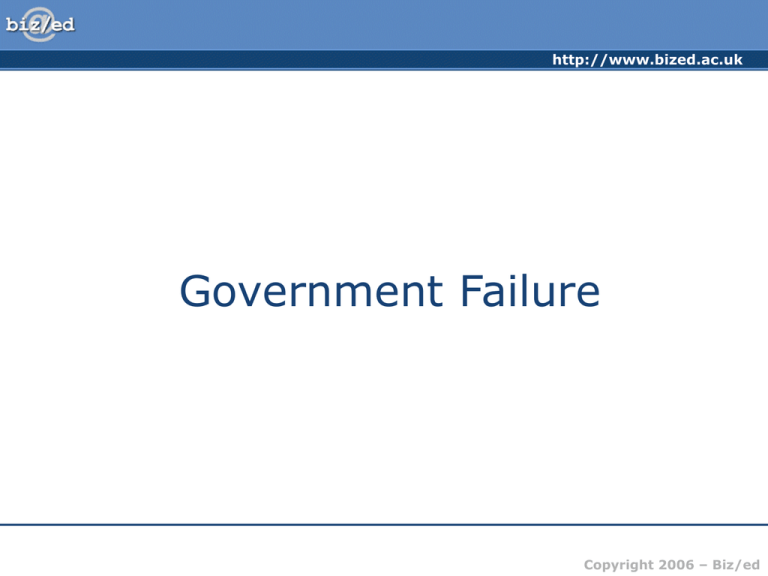
http://www.bized.ac.uk Government Failure Copyright 2006 – Biz/ed http://www.bized.ac.uk Government Failure • Government failure refers to situations where efficiency may have been reduced following government intervention in markets designed to correct market failure. Copyright 2006 – Biz/ed http://www.bized.ac.uk Government Failure • How does Government Failure manifest itself? – Distortion of markets – e.g. rent control, minimum wage, agricultural subsidies, taxes on fuel – Welfare impact – erosion of consumer surplus and producer surplus – e.g. EU tariff support for manufactured goods and food Copyright 2006 – Biz/ed http://www.bized.ac.uk Government Failure • Electoral Pressure – Desire to get elected and pass ‘popular’ policies to capture votes – e.g. spending on public services at the risk of higher inflation and future interest rates? Copyright 2006 – Biz/ed http://www.bized.ac.uk Government Failure • Public Choice Theory: Subsidies may be designed to correct a perceived market failure but they do not always please everyone – public choice? – Politicians, bureaucrats and others acting on behalf of the ‘public’ may act in their own self interest as ‘utility maximisers’. – ‘Rent seeking’ or ‘Log rolling’ - two important concepts. Title: Czech farmer protest EU accession. Copyright: Getty Images, available from Education Image Gallery Copyright 2006 – Biz/ed http://www.bized.ac.uk Government Failure • ‘Rent seeking’ or ‘Log rolling’: – Politics involves a series of trade-offs in public policy making – Traditional theory would suggest that decisions will be made that give the greatest utility to the maximum number of people – Rent seeking – where decisions are made leading to resource allocation that maximises the benefit to the decision maker at the expense of another party or parties. – Log rolling – where decisions may be made on resource allocation to projects that have less importance in return for the support of the interested party in other decision making areas. – Results from lobbying – often powerful sectors of the economy. Chosen good may not be in interests of all but only to a minority who have a powerful influence over decision makers Copyright 2006 – Biz/ed http://www.bized.ac.uk Government Failure • Regulatory Capture – Regulatory agencies become dominated by the firms they are supposed to be regulating! The railways – who controls who? Copyright: Bo de Visser, http://www.sxc.hu Copyright 2006 – Biz/ed http://www.bized.ac.uk Government Failure • Disincentive Effects – – – – – High taxes hampering business expansion or enterprise Welfare benefits reducing the incentive to find work Income taxes – distort incentives to work May encourage ‘underground markets’ – smuggling, forgeries, etc. •Short Termism – solving the ‘hot topics’ of the day rather than the long issues – e.g. ID cards versus pension term important crisis? Copyright 2006 – Biz/ed http://www.bized.ac.uk Government Failure • Imperfect information: • Lack of knowledge of: – – – – – – – – • Prices Value Costs Benefits Long term effects Behavioural changes External costs and benefits Value of producer and consumer surplus – all mean less than efficient allocation may result from government intervention. What value can be placed on the destruction of a natural environment through development? How do we value aesthetic beauty? Source: Lynne Lancaster, http://www.sxc.hu Copyright 2006 – Biz/ed http://www.bized.ac.uk Government Failure • Inadequate Information: – Knowing the consequences of the policy (e.g. building new motorways) – Knowing the effect on other markets (e.g. steel tariffs in USA) – Lack of knowledge on costs and benefits – private costs – possibly yes; social costs??? – Lack of knowledge about what the public actually wants – do we want a ban on smoking in public places?? Copyright 2006 – Biz/ed http://www.bized.ac.uk Government Failure • Administrative Cost: – High levels of bureaucracy – e.g. cost of administering CAP and farm support scheme is huge! • Conflicting Objectives: – e.g. reducing smoking and beneficial effects on health and welfare against rights of people to do as they please and tax revenue – Governments do not always know what is best for us – e.g. are the policies on illegal drugs/prostitution/pornography, etc. the right ones?? Copyright 2006 – Biz/ed

